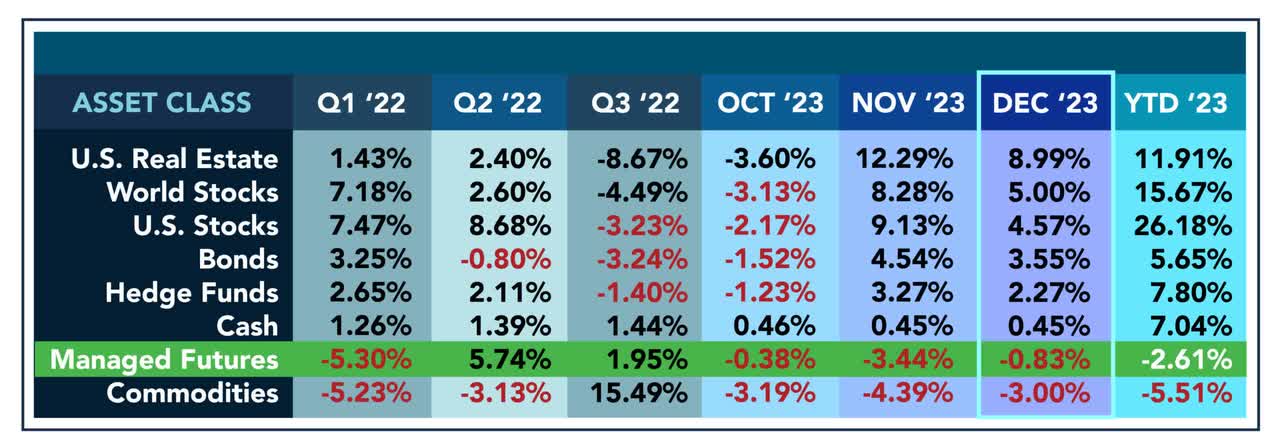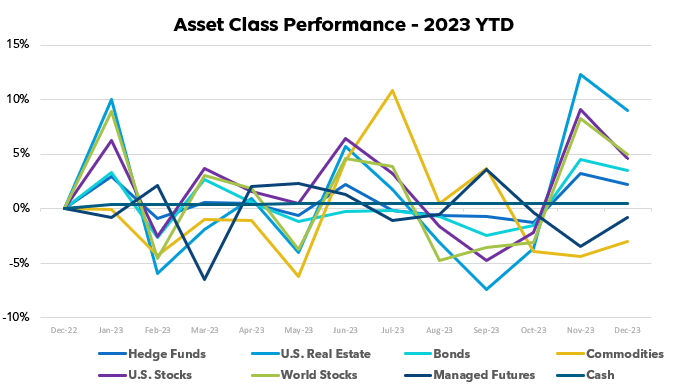Olivier Le Moal
In reflecting upon 2023’s performance results across asset classes, it is apparent this year posed considerable challenges for capital markets amidst the ongoing macroeconomic transition. Persistent inflationary pressures and central bank tightening created headwinds for many segments throughout the period.
While equities maintained respectable full-year gains, considerable monthly volatility was witnessed as geopolitical and economic unknowns shifted investor sentiment. Real estate, too, experienced pronounced swings in housing market sensitivity to monetary policy shifts.
Volatility was pronounced, with the VIX averaging over 25 compared to its historical norm of closer to 20. Monthly returns fluctuated widely, reflecting shifting sentiments toward growth and prices worldwide.
Fixed income faced ongoing pressures as yields rose sharply, impairing total returns. Commodities fluctuated wildly on changing demand expectations as recessionary risks waxed and waned.
Although not immune to swings, alternative strategies demonstrated the benefits of diversification in periods of enhanced uncertainty.
Looking ahead to 2024, diversification across uncorrelated assets and investment approaches seems prudent, given lingering questions around the trajectory of prices and growth.
Strategies incorporating flexibility to dynamically alter risk exposures – such as those employing futures and options – may provide portfolio advantages in navigating unknown conditions that typically accompany macroeconomic transitions.
Overall, while 2023 underscored both opportunity and risk inherent to investing across market cycles, it also highlighted the value of prudent diversification and risk management in achieving steady long-term capital appreciation. May the new year yield greater stability and prosperity for all market participants.

Past performance is not indicative of future results.

Past performance is not indicative of future results.
Sources:
Managed Futures = SocGen CTA Index
Cash = US T-Bill 13 week coupon equivalent annual rate/12, with YTD the sum of each month’s value
Bonds = Vanguard Total Bond Market ETF (BND)
Hedge Funds = IQ Hedge Multi-Strategy Tracker ETF (QAI)
Commodities = iShares S&P GSCI Commodity-Indexed Trust ETF (GSG)
Real Estate = iShares U.S. Real Estate ETF (IYR)
World Stocks = iShares MSCI ACWI ex-U.S. ETF (ACWX)
US Stocks = SPDR S&P 500 ETF (SPY)
All ETF performance data from Y Charts
Disclaimer
The performance data displayed herein is compiled from various sources, including BarclayHedge, and reports directly from the advisors. These performance figures should not be relied on independent of the individual advisor’s disclosure document, which has important information regarding the method of calculation used, whether or not the performance includes proprietary results, and other important footnotes on the advisor’s track record.
Benchmark index performance is for the constituents of that index only, and does not represent the entire universe of possible investments within that asset class. And further, that there can be limitations and biases to indices such as survivorship, self reporting, and instant history.
Managed futures accounts can subject to substantial charges for management and advisory fees. The numbers within this website include all such fees, but it may be necessary for those accounts that are subject to these charges to make substantial trading profits in the future to avoid depletion or exhaustion of their assets.
Investors interested in investing with a managed futures program (excepting those programs which are offered exclusively to qualified eligible persons as that term is defined by CFTC regulation 4.7) will be required to receive and sign off on a disclosure document in compliance with certain CFT rules The disclosure documents contains a complete description of the principal risk factors and each fee to be charged to your account by the CTA, as well as the composite performance of accounts under the CTA’s management over at least the most recent five years. Investor interested in investing in any of the programs on this website are urged to carefully read these disclosure documents, including, but not limited to the performance information, before investing in any such programs.
Those investors who are qualified eligible persons as that term is defined by CFTC regulation 4.7 and interested in investing in a program exempt from having to provide a disclosure document and considered by the regulations to be sophisticated enough to understand the risks and be able to interpret the accuracy and completeness of any performance information on their own.
RCM receives a portion of the commodity brokerage commissions you pay in connection with your futures trading and/or a portion of the interest income (if any) earned on an account’s assets. The listed manager may also pay RCM a portion of the fees they receive from accounts introduced to them by RCM.
See the full terms of use and risk disclaimer here.
Original Post
Editor’s Note: The summary bullets for this article were chosen by Seeking Alpha editors.

















